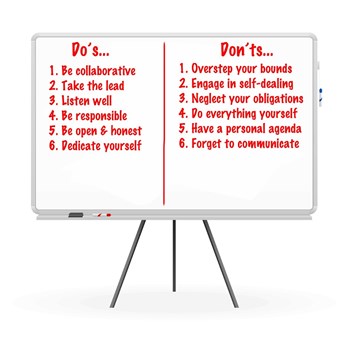
It only takes a few minutes of a web search to uncover the traits that make a successful person or business owner. For example, Entrepreneur magazine’s Steven Key wrote the article, “5 Qualities of Successful Persons,” which included such traits as open-mindedness, unwavering passion, and a forward-looking approach. But what makes a board, which is made up of individuals volunteering their time, a successful one?
Be Collaborative
Helen Keller once said, “Alone we can do so little; together we can do so much.”
The definition of collaboration is the act of working with another or others on a joint project. “Members of an effective and successful board are all on the same page,” says Dale Young, director of portfolio management, FirstService Residential in Chicago. “They are seeking improvements and infrastructure that is in the best interest of the community. In a successful board there are no personal agendas. The board should be serving in the best interest of the association as a whole.”
Listen Well
“Most people do not listen with the intent to understand; they listen with the intent to reply.”—Stephen R. Covey, The 7 Habits of Highly Effective People: Powerful Lessons in Personal Change.
When asked what makes for a successful board, Brian Lozell of Seneca Real Estate in Chicago said, “They listen to me.” His tongue-in-cheek response had a note of seriousness to it. “If you went to the dentist, you would heed his advice, right?” says Lozell. “Boards need to listen to the professionals who are engaged in the business.”
George Kotnour, president of Marian Realty in Hyde Park, Chicago, says that he hired three property managers, two of whom are certified property managers, or CPMs. He did this because he wants experienced professionals on staff and the board should recognize this. “The board should be working with a professional management company that they trust to make sure the property functions properly,” he says. “The board and the owners have to trust the property manager and allow the management company to lead the way.”
It’s also vital that board members listen to each other and to the unit owners. “You have to listen to the owners’ viewpoints,” says Dan Haumann, president of Advocate Property Management in Naperville. “Boards often want to just conduct business at the meetings and don’t want to listen. Make sure you’re not making decisions before viewpoints and opinions are shared on those things.”
Be Responsible
Actor and professional wrestler Dwayne “The Rock” Johnson had it right when he said, “Know your role.”
“You should know your role as a board member and what’s expected of you,” says Lozell. “Understand the concept of fiduciary. In essence, the board is a governing body and you’re making decisions that aren’t going to be popular, but you are responsible for the assets and the units and you have to follow the law.”
Lozell explains that as a board member, it’s important to take off your unit owner hat and leave it at the door. “You need to think of the entire association,” says Lozell.
Be More Forward-Thinking
Life is what happens to you while you're busy making other plans.”—Allen Saunders
Allen Saunders’ quote might sound like a new-age way of thinking, but the reality is that while you’re planning for today, tomorrow is coming fast, so it’s important to have a board that thinks about the ‘what-ifs,’ even when nobody wants to. As a matter of fact, thinking about tomorrow is one of the most important things a board can do for the success of the property. Successful boards are also those who look, not just at today’s issues, at tomorrow as well. “If you know you’re going to have a boiler project in a few years that will cost half a million dollars, you need to put money away now,” says Lozell.
In Hyde Park, a neighborhood and community area on the South Side of Chicago on the shore of Lake Michigan, Kotnour manages several three-story walk ups that are between 70 to 100 years old, among the 30 or so co-op and condo properties he currently manages. To protect the properties, Kotnour says that his company arranged to have all of the plumbing in the entire building replaced. “We replaced risers, gas lines and anything that has to do with plumbing, so they are set for almost 40 years,” he says. “That board looks to the future and it pays off because when a unit goes on the market there, it doesn’t stay on for more than a month and a half before it’s sold. There also aren’t going to be big special assessments because it’s a well-cared for property.”
Dedicate Yourself
“We all have dreams. But in order to make dreams come into reality, it takes an awful lot of determination, dedication, self-discipline, and effort.” – Jesse Owens
Kotnour has been in the property management business for 47 years, so he’s seen his share of boards through the years. He says the most successful ones have members who stay on the board for an undetermined amount of time. “I have found that the most important aspect of a successful board is that they don’t change every year,” he says. “Changing every year makes for a disjointed board.”
He does recognize that a board comes with personality conflicts and power politics, but, he says, “you have to get a feeling for the people you’re serving and know exactly what’s going on.”
Remember to Communicate
“The single biggest problem in communication is the illusion that it has taken place,” says George Bernard Shaw.
When you’re not listening, make sure you’re communicating, says Haumann, who has been in the property management business for 15 years and currently manages more than 60 properties. “Always respond promptly, even if you don’t have the answer,” he says. “Tell them you’ll get back in touch with them right away.”
There’s a way to communicate as well. “Communicate in a positive light,” says Haumann. “Tell them why is it good to do it as opposed to ‘the declaration says so,’ Focus on the positive, not the negative. Don’t just communicate the facts, but tell them why it’s good.”
For example, an association has a problem with some cars in the parking lot that have flats, are broken down or are on jacks. “Instead of saying, ‘if it continues, you’ll be towed,’ tell them why it’s bad and that the board wants to focus on keeping the parking lot safe,” says Haumann. “Cars on jacks are dangerous and if the kids are around that area they can get hurt. The declarations may say so, but you don’t need to say it that way.”
Be Respectful of Other Opinions
The famed comedian Rodney Dangerfield made it his mantra that he gets no respect, but the last thing you want is for board members and unit owners to feel that way.
“Treat everyone uniformly and fairly,” says Haumann. “You can’t treat one neighbor one way and the guy that has the dog who is always pooping on the property differently,” he says.
Be Open and Honest
“It is better to offer no excuse than a bad one,”—George Washington.
“Share as much information as possible with the owners,” says Haumann. “An open board is perceived as an honest and fair board, especially when it comes to financials and contracts. If you aren’t open and honest, you look like you’re trying to hide something. Talk about how much money there is in reserves, what you spent money on last month and what big expenses are coming up. Who are you contracting with and why did you pick those people? Keep it all on the table.”
Kotnour sums it up by saying, “There is no question – you have to remember, two way street, communication is not unilateral, it’s bilateral. Rely on you to give expert advice.”
Watch Carefully
On the flip side, some boards struggle and succumb to pitfalls. “Political in-fighting can cause a board to be completely ineffective,” says Young. “You will never accomplish association business when members are fighting each other instead of figuring out how to work with each other. Respect one another’s opinions, even if from another vantage.”
“Don’t act as a dictator,” says Haumann. “Boards always have one strong personality on them and they end up driving the decision-making. Good boards should try not to let that happen.”
By studying and implementing these traits, the board has a greater chance of success and longevity, without serious problems.
Lisa Iannucci is a freelance writer and a frequent contributor to The Chicagoland Cooperator.






Leave a Comment